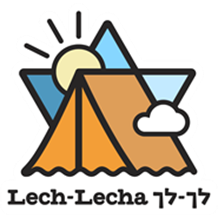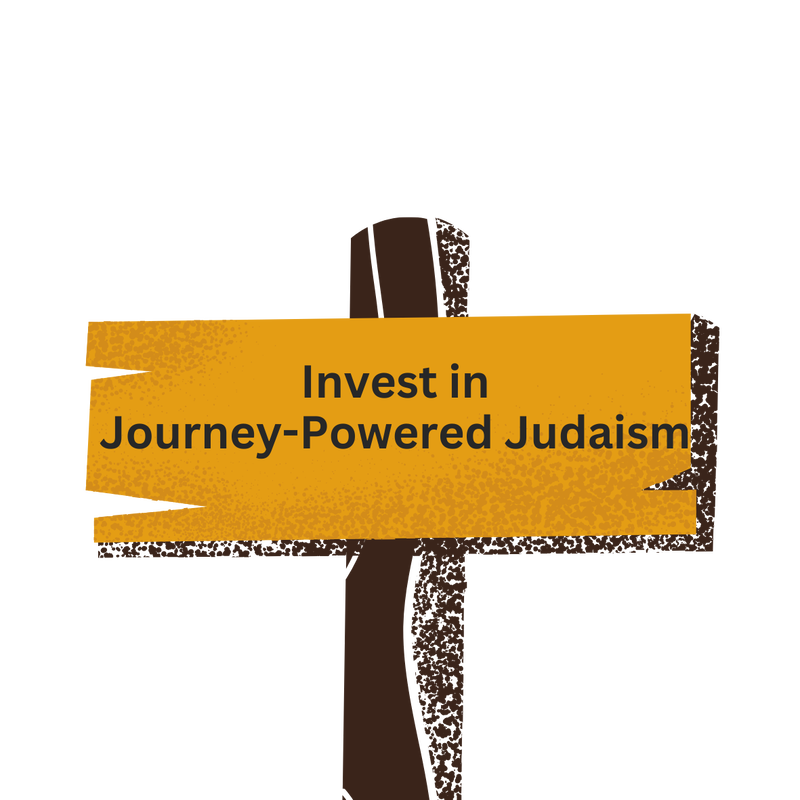
July 17, 2024
בָּלָ֖ק Balak
Sashya Clark,
Director of Outreach & Engagement
Parashat Balak is a well-known portion of the Torah, rich with intriguing narratives and profound lessons. In this parasha, Balak, the king of Moab, hires the prophet Balaam to curse our people, the Israelites. Balaam embarks on this journey atop his donkey, who, after being struck three times, astonishingly speaks to Balaam, highlighting the divine disapproval of this mission...and WHY isn't anyone freaking out about the talking donkey?!?! This unexpected twist underscores a deeper message: sometimes, we need to step back and immerse ourselves in nature to see things from a new perspective. The story of Balaam's journey up the mountains with Balak illustrates how nature, particularly the lofty heights of mountains, can change our viewpoint and offer clarity.
What does Balaam anticipate will happen if he hikes into the mountains of Moab? He has already told Balak and the men that the “rules are I can only speak what G-d tells me,” and he already knows that G-d doesn’t want to curse our people. If he is a prophet for hire, doesn’t he already know that he is probably going to come home with empty pockets?
There are two different perspectives at play.
Balak’s perspective is that there are multiple gods at various locations. He is willing to drag his men and his possessions across the mountain pass, not once, but twice, and then up a third summit to a peak to consult three different gods to see if any one of them will curse our people. He believes cursing us is the only way to save his people from famine.
And this is no afternoon stroll through Central Park. Mount Nebo is 4000 ft above the Dead Sea. This is a multi-day excursion.
Mountains, in many ancient spiritual traditions including our own (think Mount Sinai), are seen as places of divine encounter and revelation. The act of climbing a mountain symbolizes a journey towards greater understanding and enlightenment. For Balaam, being on the mountains didn’t change his view of our people. I am not sure what he expected to change. Did he believe that G-d would change his mind? Maybe he, too, believed that G-d was one of many, and that another local god would step in and provide a curse that he could speak, if only he positioned himself correctly.
The Torah tells us he speaks not one, but three blessings, each one stronger than the last. The final blessing is so beautiful and so meaningful, that it makes its way through the annals of time into our siddur, and becomes known as the “Mah Tovu.” This new perspective, combined with the serene and majestic environment of the mountains, enabled him to connect more deeply with the Source of all, overriding his initial intentions.
The three mountain passes he had to traverse because of his reluctance to stay out of this conflict may be justice for the three times he struck his donkey.
But I think there's more.
Much like Balaam, the retreat from our daily lives - the very ACT of being somewhere else - dampens the cacophony, and allows the steady, subtle, voice of the Eternal within us to take center stage. It feels amplified, because the contrast and competing frequencies are paused, but the volume hasn’t changed. We’ve changed.
I don’t believe this trek changed Balaam’s feelings about our people. I think he started the journey knowing he couldn’t curse us, and returned home the same. But it may have changed his perspective of G-d. Perhaps he considered G-d to be one of many when he left home, and returned home to see the Oneness in all of creation. The Torah doesn’t say.
In a contemporary context, this story underscores the benefits of making time to break away from our routine to spend time in nature. The physical act of hiking or climbing not only invigorates the body but also quiets the mind, providing a space for reflection and clarity. The expansive views from a mountaintop can help us to see beyond our immediate concerns, and offer a broader perspective on our lives and challenges. Just as Balaam's view from the mountaintop shifted his intentions and brought forth blessings, so too can our experiences in nature inspire new insights, foster inner peace, and lead to positive transformations in our lives.
Shabbat Shalom!
בָּלָ֖ק Balak
Sashya Clark,
Director of Outreach & Engagement
Parashat Balak is a well-known portion of the Torah, rich with intriguing narratives and profound lessons. In this parasha, Balak, the king of Moab, hires the prophet Balaam to curse our people, the Israelites. Balaam embarks on this journey atop his donkey, who, after being struck three times, astonishingly speaks to Balaam, highlighting the divine disapproval of this mission...and WHY isn't anyone freaking out about the talking donkey?!?! This unexpected twist underscores a deeper message: sometimes, we need to step back and immerse ourselves in nature to see things from a new perspective. The story of Balaam's journey up the mountains with Balak illustrates how nature, particularly the lofty heights of mountains, can change our viewpoint and offer clarity.
What does Balaam anticipate will happen if he hikes into the mountains of Moab? He has already told Balak and the men that the “rules are I can only speak what G-d tells me,” and he already knows that G-d doesn’t want to curse our people. If he is a prophet for hire, doesn’t he already know that he is probably going to come home with empty pockets?
There are two different perspectives at play.
Balak’s perspective is that there are multiple gods at various locations. He is willing to drag his men and his possessions across the mountain pass, not once, but twice, and then up a third summit to a peak to consult three different gods to see if any one of them will curse our people. He believes cursing us is the only way to save his people from famine.
And this is no afternoon stroll through Central Park. Mount Nebo is 4000 ft above the Dead Sea. This is a multi-day excursion.
Mountains, in many ancient spiritual traditions including our own (think Mount Sinai), are seen as places of divine encounter and revelation. The act of climbing a mountain symbolizes a journey towards greater understanding and enlightenment. For Balaam, being on the mountains didn’t change his view of our people. I am not sure what he expected to change. Did he believe that G-d would change his mind? Maybe he, too, believed that G-d was one of many, and that another local god would step in and provide a curse that he could speak, if only he positioned himself correctly.
The Torah tells us he speaks not one, but three blessings, each one stronger than the last. The final blessing is so beautiful and so meaningful, that it makes its way through the annals of time into our siddur, and becomes known as the “Mah Tovu.” This new perspective, combined with the serene and majestic environment of the mountains, enabled him to connect more deeply with the Source of all, overriding his initial intentions.
The three mountain passes he had to traverse because of his reluctance to stay out of this conflict may be justice for the three times he struck his donkey.
But I think there's more.
Much like Balaam, the retreat from our daily lives - the very ACT of being somewhere else - dampens the cacophony, and allows the steady, subtle, voice of the Eternal within us to take center stage. It feels amplified, because the contrast and competing frequencies are paused, but the volume hasn’t changed. We’ve changed.
I don’t believe this trek changed Balaam’s feelings about our people. I think he started the journey knowing he couldn’t curse us, and returned home the same. But it may have changed his perspective of G-d. Perhaps he considered G-d to be one of many when he left home, and returned home to see the Oneness in all of creation. The Torah doesn’t say.
In a contemporary context, this story underscores the benefits of making time to break away from our routine to spend time in nature. The physical act of hiking or climbing not only invigorates the body but also quiets the mind, providing a space for reflection and clarity. The expansive views from a mountaintop can help us to see beyond our immediate concerns, and offer a broader perspective on our lives and challenges. Just as Balaam's view from the mountaintop shifted his intentions and brought forth blessings, so too can our experiences in nature inspire new insights, foster inner peace, and lead to positive transformations in our lives.
Shabbat Shalom!

June 11, 2024
שָׁבוּעוֹת Shavuot
Nadav Slovin,
Founder and Executive Director
I love the Torah.
I love Shavuot.
But there is something I just never understood.
Didn’t we already celebrate this holiday? Did we not dance with the Torah but eight months ago on Simchat Torah?
Indeed, this year, we could ALL use a second Simchat Torah. But what really is the difference between these twin holidays? So twin they are that they even share the same name - Atzeret, meaning the conclusion or cessation. Simchat Torah is celebrated on Shmini Atzeret, marking the conclusion of Sukkot, while Shavuot is referred to as Atzeret as it marks the conclusion of Passover and the counting of the omer.
But how could it be? Twin holidays? No way.
And, of course, if we look deeper, you will see that, like most twins, these two holidays are in some ways polar opposites.
You see, on Simchat Torah we dance with closed Torah scrolls. On Shavuot, we open them up and dive in. We dive in on Shavuot to what we call Tikkun Leil Shavuot, literally the fixing on the night of Shavuot.
What must be fixed? Well, you see, the Midrash teaches us that when our people awaited revelation at Mount Sinai we… got tired, slept in, hit snooze 😴one too many times and HaShem had to knock on our huts 🛖 - “hey, Am Yisrael, wake up!”
Since then, every year, we say “never again! We’re staying up all night!
But we are fixing so much more than just the batteries in our alarm clock.
Why do we sleep away our lives? Why are we scared to meet HaShem? Why are we running away from our mission?
It’s because we don’t believe that anyone would truly believe in us.
Me? I have a part in the Divine story? A lead role, you say? No way.
HaShem gave us one primary instruction at Mount Sinai: listen 👂. Us, we asked? I can’t hear G-d speak directly to me. We’re gonna die. No way I can handle that. Moses, you do it, pass the message along. We’re… going back to sleep.
Want to hear the craziest thing? It’s what you already know. During the counting of the omer we journey through 49 forms of divine emanation. We climb a mountain of sefirot, audaciously claiming that we have (at least the potential for) even the slightest understanding of G-d. We claim to have surmounted insurmountable, to have reached the infinite, to have drawn transcendence down.
At the conclusion of Sukkot, having gathered in the harvest and achieved the highest highs, we close the scroll in order to remind ourselves how little we know, dancing round and round in forgetful joyous bliss celebrating the mystery.
On Shavuot, we open up the scroll, fixing our fear and our sleep, remembering that, somehow, this mystery is My Story, a story that I can get even the slightest, yet most wondrous understanding of, a story that I am worthy to receive.
Chag Sameach!
שָׁבוּעוֹת Shavuot
Nadav Slovin,
Founder and Executive Director
I love the Torah.
I love Shavuot.
But there is something I just never understood.
Didn’t we already celebrate this holiday? Did we not dance with the Torah but eight months ago on Simchat Torah?
Indeed, this year, we could ALL use a second Simchat Torah. But what really is the difference between these twin holidays? So twin they are that they even share the same name - Atzeret, meaning the conclusion or cessation. Simchat Torah is celebrated on Shmini Atzeret, marking the conclusion of Sukkot, while Shavuot is referred to as Atzeret as it marks the conclusion of Passover and the counting of the omer.
But how could it be? Twin holidays? No way.
And, of course, if we look deeper, you will see that, like most twins, these two holidays are in some ways polar opposites.
You see, on Simchat Torah we dance with closed Torah scrolls. On Shavuot, we open them up and dive in. We dive in on Shavuot to what we call Tikkun Leil Shavuot, literally the fixing on the night of Shavuot.
What must be fixed? Well, you see, the Midrash teaches us that when our people awaited revelation at Mount Sinai we… got tired, slept in, hit snooze 😴one too many times and HaShem had to knock on our huts 🛖 - “hey, Am Yisrael, wake up!”
Since then, every year, we say “never again! We’re staying up all night!
But we are fixing so much more than just the batteries in our alarm clock.
Why do we sleep away our lives? Why are we scared to meet HaShem? Why are we running away from our mission?
It’s because we don’t believe that anyone would truly believe in us.
Me? I have a part in the Divine story? A lead role, you say? No way.
HaShem gave us one primary instruction at Mount Sinai: listen 👂. Us, we asked? I can’t hear G-d speak directly to me. We’re gonna die. No way I can handle that. Moses, you do it, pass the message along. We’re… going back to sleep.
Want to hear the craziest thing? It’s what you already know. During the counting of the omer we journey through 49 forms of divine emanation. We climb a mountain of sefirot, audaciously claiming that we have (at least the potential for) even the slightest understanding of G-d. We claim to have surmounted insurmountable, to have reached the infinite, to have drawn transcendence down.
At the conclusion of Sukkot, having gathered in the harvest and achieved the highest highs, we close the scroll in order to remind ourselves how little we know, dancing round and round in forgetful joyous bliss celebrating the mystery.
On Shavuot, we open up the scroll, fixing our fear and our sleep, remembering that, somehow, this mystery is My Story, a story that I can get even the slightest, yet most wondrous understanding of, a story that I am worthy to receive.
Chag Sameach!

April 16, 2024
לך-לך Lech-Lecha Go to You
Eden Levi
Lech-Lecha לך-לך Adventure Camp Trek Leader, 2024
Lech Lecha, go to you
Through the desert
Grow thru 🏜️
Heat and sand
Rocks and dry sun
Water flows…
Subtle growth 🌵
It’s a Midbar moon night
Stars glow and lizards go
Thru valley highs
And mountain lows
✨🦎⛰️
Roots and rocks
Earth dust
Desert trust
Day by day
Returning
Gifting
Digging
Wells of Torah life living 💦
Dancing winds sing and blow
Free shapes humming
Heart beat pumping
Stillness, Shabbat
Resting, peace
My friend, it’s okay
Just be
It’s a midbar mission
A desert journey 🐫🐪
The warmth and heat
Pass on the fire
Shine forth and share
Bold beams
Blue skies
Unbreakable joy
Unbendable belief ☀️☀️
And when your bush ignites
Endure with strength.
A Paradoxical embrace
I promise,
It will all be okay!
So hang on and head there
And hold the joy
Of excited fright
When a mountain of love
Hangs above
It’s you calling
Your voice echoing 🌿🌱🍃
Lech Lecha
Thru you to you
Inside
Lech lecha
Into you
Dive into the magic meeting
Of sparkle rains
With Monsoon winds
and cactus haze
Open your heart
To the gifts of the cloudy shade and guiding flames
It’s an inside journey
A Midbar mission
Journey toward and thru
Lech Lecha
Go to you
🌓🏕️✡️🪵🌻
לך-לך Lech-Lecha Go to You
Eden Levi
Lech-Lecha לך-לך Adventure Camp Trek Leader, 2024
Lech Lecha, go to you
Through the desert
Grow thru 🏜️
Heat and sand
Rocks and dry sun
Water flows…
Subtle growth 🌵
It’s a Midbar moon night
Stars glow and lizards go
Thru valley highs
And mountain lows
✨🦎⛰️
Roots and rocks
Earth dust
Desert trust
Day by day
Returning
Gifting
Digging
Wells of Torah life living 💦
Dancing winds sing and blow
Free shapes humming
Heart beat pumping
Stillness, Shabbat
Resting, peace
My friend, it’s okay
Just be
It’s a midbar mission
A desert journey 🐫🐪
The warmth and heat
Pass on the fire
Shine forth and share
Bold beams
Blue skies
Unbreakable joy
Unbendable belief ☀️☀️
And when your bush ignites
Endure with strength.
A Paradoxical embrace
I promise,
It will all be okay!
So hang on and head there
And hold the joy
Of excited fright
When a mountain of love
Hangs above
It’s you calling
Your voice echoing 🌿🌱🍃
Lech Lecha
Thru you to you
Inside
Lech lecha
Into you
Dive into the magic meeting
Of sparkle rains
With Monsoon winds
and cactus haze
Open your heart
To the gifts of the cloudy shade and guiding flames
It’s an inside journey
A Midbar mission
Journey toward and thru
Lech Lecha
Go to you
🌓🏕️✡️🪵🌻
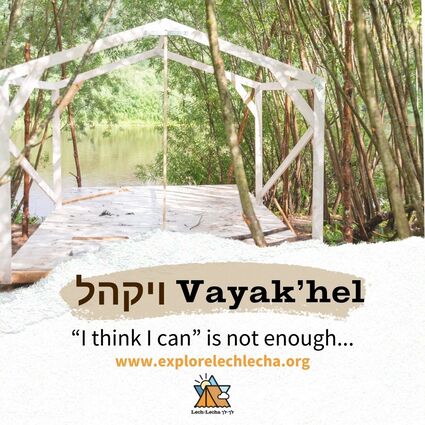
March 5, 2024
"I Think I Can" is Not Enough
Nadav Slovin
Lech-Lecha לך-לך Founder and Executive Director
It’s pretty easy to imagine flying, but taking flight is much harder.
Parashat Vayakhel begs the famous question: Why does the Torah repeat the details of the construction of the mishkan, G-d’s dwelling place, so many times?
Indeed this question opens the doors to layers of understanding and insight, but I’d like to focus on the most simple understanding. The first description in Parashat Terumah is the command or intention to build, while this week’s Parashah is the construction and manifestation.
The lesson is simple but extraordinarily relevant for our generation. It is one thing to envision. It is an entirely different thing to perform and embody with precision. Often philosophies and ideologies look, sound, and feel so delicious from without, but when ingested, when enacted, they can be tasteless or bitter. Within every word of our parashah lies intense anticipation: will it stand? This is the question that each of us has to ask ourselves in our generation: will it stand? Can my vision of the world and our people truly stand through the stormy winds of exile, from generation to generation, leading the world to Shalom?
May we be blessed to put our visions to the test. May we have the courage to ask if it will stand. May we do everything in our power to manifest our dreams into reality. And may Hashem provide us the wisdom to know when to rethink.
"I Think I Can" is Not Enough
Nadav Slovin
Lech-Lecha לך-לך Founder and Executive Director
It’s pretty easy to imagine flying, but taking flight is much harder.
Parashat Vayakhel begs the famous question: Why does the Torah repeat the details of the construction of the mishkan, G-d’s dwelling place, so many times?
Indeed this question opens the doors to layers of understanding and insight, but I’d like to focus on the most simple understanding. The first description in Parashat Terumah is the command or intention to build, while this week’s Parashah is the construction and manifestation.
The lesson is simple but extraordinarily relevant for our generation. It is one thing to envision. It is an entirely different thing to perform and embody with precision. Often philosophies and ideologies look, sound, and feel so delicious from without, but when ingested, when enacted, they can be tasteless or bitter. Within every word of our parashah lies intense anticipation: will it stand? This is the question that each of us has to ask ourselves in our generation: will it stand? Can my vision of the world and our people truly stand through the stormy winds of exile, from generation to generation, leading the world to Shalom?
May we be blessed to put our visions to the test. May we have the courage to ask if it will stand. May we do everything in our power to manifest our dreams into reality. And may Hashem provide us the wisdom to know when to rethink.
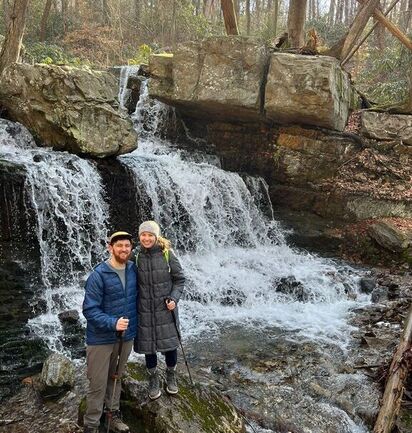 Raffi, and wife, Daphne, on a recent Lech-Lecha Retreat
Raffi, and wife, Daphne, on a recent Lech-Lecha Retreat
Feb 8, 2024
Step by Step: Parsha Mishpatim
Raffi Levi
Director of Teen Programming
We all find ourselves in a place in life where we would like to make a lasting change.
For example, perhaps, a person loves watching TV, but then doesn’t make the time to take care of her chores, or making herself something to eat, or create a space for journaling, art, or spending time in nature. Whatever it is we want to do, we often find we haven't enough time for it.
How might such a person make the changes to create a more productive evening for herself?
Ultimately this comes down to the question of how we create meaningful and lasting change in our lives. We know that growth requires slow and steady change for it to be sustainable, but does our Torah speak to this?
Certainly, the journey of a hike teaches us that the best way forward is step by step - not running or stretching beyond our limits.
The very end of last week’s Torah portion meets up with the beginning of this week’s portion in an odd way: as Yitro is ending we are describing different laws, including an interesting one about the altar. Then the description of laws continues into this week’s torah portion.
But there is a break in these passages. The first verse states
כג) וְלֹֽא־תַעֲלֶ֥ה בְמַעֲלֹ֖ת עַֽל־מִזְבְּחִ֑י אֲשֶׁ֛ר לֹֽא־תִגָּלֶ֥ה עֶרְוָתְךָ֖ עָלָֽיו׃
Do not ascend My altar via stairs, [rather a ramp,] lest you reveal yourself upon [the alter].
The following verse, the one beginning our Torah portion, states
וְאֵ֙לֶּה֙ הַמִּשְׁפָּטִ֔ים אֲשֶׁ֥ר תָּשִׂ֖ים לִפְנֵיהֶֽם׃
These are the rules that you shall set before them:
And ultimately, the Torah continues to recite laws. Why?
The great Hasidic thinker, Rabbi Noam Elimelech of Lizhensk shares a deep insight explaining this abrupt shift in the Torah - a bump on the trail of our journey through the text.
When the first verse tells us not to take steps up to the alter, he explains that in a person’s life, one should also not take too big of a step. He explains:
"When a person lifts themselves beyond their own level, they also lift up their baseness accordingly, and they will fall toward questioning and foreign thoughts, G-d forbid. But when one is full of praise for the sake of recognizing one’s own goodness, then, in accordance with one’s ability to recognize their goodness and the ability to be grateful, he will not be harmed."
Rabbi Elimelech explains that when we are too egotistical - when we go too far beyond our abilities in that moment - we are bound to fall.
We find this danger on the trail too - walking with too much confidence - we can forget the bumps in the trail from the undergrowth. But if we are thoughtful about our limits, and mindful of our steps, we CAN succeed. We can slow down, and take small steps forward!
Rabbi Elimelech explains that the way we reach a belief in ourselves that is reasonable is by recognizing our own greatness! When we are full of praise to Hashem and recognize the goodness and power within us, it is in doing that fully that we can know our limits. It is, in actuality, that we see our true selves when we look at ourselves from a place of gratitude and joy.
On one Lech-Lecha hike last summer, just as we were beginning to ascend the mountain, one of our trekkers fell back, feeling tired. “I don’t think I can do it,” he said to me. “This is far more challenging than I expected!”
We all begin to lose confidence when our journey becomes challenging. In those moments we can say to ourselves, “look how far I have already come” and reach out for support.
I like to play a game when hikes get challenging: I look out for a tree in the immediate distance and say to myself, "When I meet that tree I will take time to rest." Breaking the mountain down into small, bite-size goals can help us move farther than we expected!
And this is why, right after we learn the rule about building a ramp rather than stairs, our Torah portion begins with the line:
“These are the rules that you shall set before them”
Because, as Rashi explains, this verse is telling us that the laws of the Torah are set before us “like food at a set table, open for the taking." The teaching is open to us. We have the opportunity to embrace them from a place of self-love and gratitude. The Torah is given to us as an opportunity for growth, joy, and love - a self-love that is not egotistical, but recognizes that our blessings and privileges in life only come from Hashem, and we see that in ourselves. It is not a journey of the ego, but a journey of the joyous, soulful, giving self.
The word for soul (neshama) and breath (neshima) in Hebrew have the same root. Breath is a beautiful metaphor for the soul, since as soon as we fill ourselves up with the breath of life, we exhale, and give life back to the world (the CO2 to feed the trees!). Living a soulful life is both the taking and the giving.
When we are out there on our journeys, we cannot take a step that’s too big. On the trail, if one does this, we soon realize our mistake. On the trail we embrace the journey as a process of one step at a time.
This is true of all kinds of change. Small steps = sustainable growth. If one struggles to create time for themselves to do meaningful things, that person can slowly add one new habit - one new step at a time - and over the journey of months and years, can look back and say, "Thank you, Hashem. Look how far we have come!"
May we enter this Shabbat with peace, mindfulness, soulful giving, and embrace all the beautiful merits we have.
Shabbat Shalom!
Raffi Levi and Team Lech-Lecha
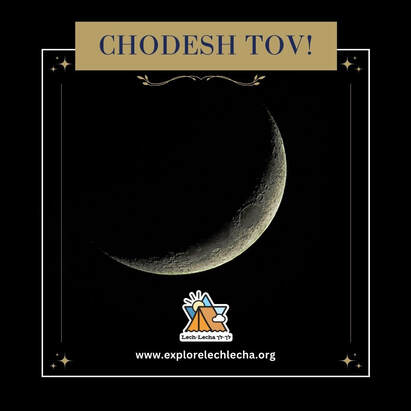
Jan 11, 2024
I Don't Know!
Zach Subar
Lech-Lecha לך-לך Board of Directors, Member at Large
I Don't Know!
“And it was in the fortieth year in the eleventh month,' on Rosh Chodesh (the first day of) Shevat, [that Moshe] gathered the people and said to them, "The time of my death has arrived; and if there is from [among] you someone who heard a law and forgot it, he should come to me and ask me, and I will elucidate it. And anyone who has a doubt about a question, he should come, and I will explain it to him.” – Rambam, Introduction to the Mishnah
There seems to be a clear connection between today—the first day of the month of Shevat, the month best known for celebrating the earth’s produce--and resolving the questions that most haunt us. It is a day where any shame a person feels about not knowing—a phenomenon that keeps many of us from asking questions in the first place—can be nullified. Moshe tells us this himself. If we find ourselves becoming the one who ‘does not know how to ask,’ the fourth son we read about in the Pesach Haggadah, Rosh Chodesh Shevat is the day where we can begin to ask, without fear. This is a day where all questions begin to be answered, and where it seems possible for self-doubt to be washed away.
What, then, gives foundation to the connection between fruits and self-confidence? After all, Tu B’Shevat is the holiday best associated with the month. Tu B’Shevat, a holiday on the 15th of the month, is the day that celebrates the new year for trees. It is one of the four “new years” in the Jewish calendar. Technically, it means that fruits that formed after this date cannot be tithed along with fruits that were formed before the date. In practice, though, it’s a day where it is a Kabbalistic custom to hold a “Tu B’Shevat seder,” where we eat fruit and drink wine and celebrate the earth’s bounty. We especially celebrate the bounty of the Land of Israel’s produce.
Maybe, though, we are celebrating more than that? According to Rashi:
"[What is the significance of the 1st/15th of Shevat?] Since the bulk of the rainy season is already passed; now the sap begins to rise in the trees. The fruits will begin to blossom at this point." – Rashi, Rosh Hashanah 14a
We can only blossom when we begin to realize our true purpose in the world. It’s possible to feel smothered in so many ways. We can feel physically smothered, but often, we waste away in our own prisons, letting our fear keep us from our dreams. What do we need to do? We need to let the sap inside us rise and let us blossom in the ways we are meant to.
That can only happen if we admit something simple to ourselves.
“I don’t know.”
What a powerful phrase!
I don’t know Hashem’s intentions; I don’t know the meaning of life; I don’t know why there is pain and suffering in the world. I don’t know.
Only when we admit this can we begin to ask the deep questions that plague us, without reservation or fear, just as Moshe tells us.
“Come closer, my people,” he is saying. “It’s all okay. You are loved.”
Only then can our sap rise.
We can then become fully realized beings, created in Hashem’s image.
Chodesh Tov!
-Zach Subar and the Lech-Lecha Team
Zach works in transit by day and transit by night - Jerusalem transit planning is only practice for the real work: connecting Jewish people of all sorts, beyond state and demographic lines. Zach loves spending time in the outdoors, traveling, and exploring in conversation. He comes alive in encounter with the many faces of the Jewish people.
I Don't Know!
Zach Subar
Lech-Lecha לך-לך Board of Directors, Member at Large
I Don't Know!
“And it was in the fortieth year in the eleventh month,' on Rosh Chodesh (the first day of) Shevat, [that Moshe] gathered the people and said to them, "The time of my death has arrived; and if there is from [among] you someone who heard a law and forgot it, he should come to me and ask me, and I will elucidate it. And anyone who has a doubt about a question, he should come, and I will explain it to him.” – Rambam, Introduction to the Mishnah
There seems to be a clear connection between today—the first day of the month of Shevat, the month best known for celebrating the earth’s produce--and resolving the questions that most haunt us. It is a day where any shame a person feels about not knowing—a phenomenon that keeps many of us from asking questions in the first place—can be nullified. Moshe tells us this himself. If we find ourselves becoming the one who ‘does not know how to ask,’ the fourth son we read about in the Pesach Haggadah, Rosh Chodesh Shevat is the day where we can begin to ask, without fear. This is a day where all questions begin to be answered, and where it seems possible for self-doubt to be washed away.
What, then, gives foundation to the connection between fruits and self-confidence? After all, Tu B’Shevat is the holiday best associated with the month. Tu B’Shevat, a holiday on the 15th of the month, is the day that celebrates the new year for trees. It is one of the four “new years” in the Jewish calendar. Technically, it means that fruits that formed after this date cannot be tithed along with fruits that were formed before the date. In practice, though, it’s a day where it is a Kabbalistic custom to hold a “Tu B’Shevat seder,” where we eat fruit and drink wine and celebrate the earth’s bounty. We especially celebrate the bounty of the Land of Israel’s produce.
Maybe, though, we are celebrating more than that? According to Rashi:
"[What is the significance of the 1st/15th of Shevat?] Since the bulk of the rainy season is already passed; now the sap begins to rise in the trees. The fruits will begin to blossom at this point." – Rashi, Rosh Hashanah 14a
We can only blossom when we begin to realize our true purpose in the world. It’s possible to feel smothered in so many ways. We can feel physically smothered, but often, we waste away in our own prisons, letting our fear keep us from our dreams. What do we need to do? We need to let the sap inside us rise and let us blossom in the ways we are meant to.
That can only happen if we admit something simple to ourselves.
“I don’t know.”
What a powerful phrase!
I don’t know Hashem’s intentions; I don’t know the meaning of life; I don’t know why there is pain and suffering in the world. I don’t know.
Only when we admit this can we begin to ask the deep questions that plague us, without reservation or fear, just as Moshe tells us.
“Come closer, my people,” he is saying. “It’s all okay. You are loved.”
Only then can our sap rise.
We can then become fully realized beings, created in Hashem’s image.
Chodesh Tov!
-Zach Subar and the Lech-Lecha Team
Zach works in transit by day and transit by night - Jerusalem transit planning is only practice for the real work: connecting Jewish people of all sorts, beyond state and demographic lines. Zach loves spending time in the outdoors, traveling, and exploring in conversation. He comes alive in encounter with the many faces of the Jewish people.
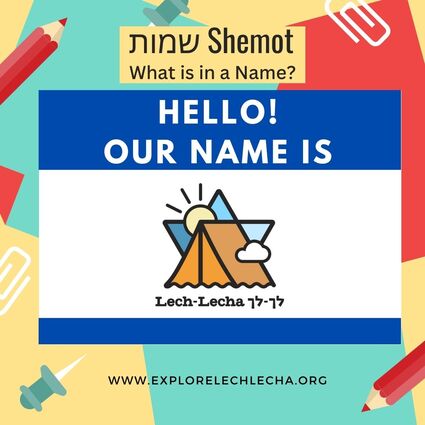
Jan 3, 2024
שמות Shemot
What’s in a Name?
Sashya Clark,
Director of Online Engagement
This week we start Sefer Shemot, the section of the Torah that takes us on a transformational journey from a family tribe to nation of tribal families beginning in Parshat Shemot.
The Torah doesn’t name this book “The Sefer of Transformation.” It names this book of the Torah, “Shemot - Names” Which leads me to ask the question, “What, exactly, is in a name?”
In the beginning, in Beresheit, Adam’s first task was to name all the creatures, even before he was given a wife and given the first commandment to be fruitful and multiply, teaching us the importance of naming things. The skill of naming things, defining our terms, and clarifying our assumptions are all keys to civil and effective discourse. In the Jewish world, in the social media war of late, we have been reminded of the desperate need to bring forth clear and effectual language. We have returned to calling things by their real names, and finding the truth effervescing from our definitions.
As Shakespeare wrote in Romeo and Juliet, “That which we call a rose, by any other word would smell as sweet.” But calling a rose, “flower” or “plant” obscures the meaning we are conveying with our words in the sweeping generalization, despite the powerlessness of the word choice to change the fragrance of the petals.
The names we give, and have been given aren’t merely titles, but convey our essence. Our name isn’t just that which we prefer to be called, it is also be our reputation, our role in relationship to another, and sometimes even our past slights.
Our sages teach that we generally have three names: The one our parents give us, the one our friends call us, and the one we give ourselves.
And then, of course, there is the name that G-d gives us.
So, now I will ask you: What is your name? Does it connect you to your past? An ancestor, a story, a season of wrestling?
Or, does your name propel you forward?
How does your name strengthen YOU on your Jewish Journey? What is in your name?
Drop a comment on our social media channels and let us know!
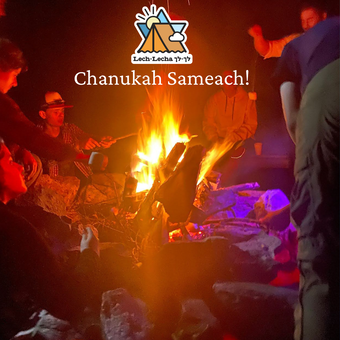
December 14, 2023
חנוכה
Nadav Slovin
Founder and Director of Lech-Lecha
Chanukah Sameach!
There is nothing in the world like a flame.
A flame is the ultimate paradox.
Visible yet Intangible. Feeble yet Formidable. Earthly yet Celestial.
A flame never stands alone, always formed in partnership.
On Chanukah, three partake: oil, wick, and fire.
In the Torah a candle’s fire is called Ner נר.
The wick is called Petilah פטילה.
Oil is Shemen שמן.
The first letters of these three words combined creates NePheSh נפש - the embodied soul.*
Who am I? What is the human soul?
The soul never stands alone, always formed in partnership.
Like the oil of a candle, I have a body.
Light the wick that draws the oil towards the flame, I have a mind that drives my body to act.
And like the fire, the spirit, the breath of life, flows through me.
Together, my body, mind, and spirit produce my NePheSh נפש, my embodied soul, my flame.
The embodied soul, the human, is the ultimate paradox.
Visible yet Intangible. Feeble yet Formidable. Earthly yet Celestial.
Tonight we light our final Chanukah candle.
The eighth night, beyond the cycle of seven, beyond wholeness reaching into transcendence.
Will we suffice with lighting the fire without, or will we let the flames light our souls on fire?
חנוכה
Nadav Slovin
Founder and Director of Lech-Lecha
Chanukah Sameach!
There is nothing in the world like a flame.
A flame is the ultimate paradox.
Visible yet Intangible. Feeble yet Formidable. Earthly yet Celestial.
A flame never stands alone, always formed in partnership.
On Chanukah, three partake: oil, wick, and fire.
In the Torah a candle’s fire is called Ner נר.
The wick is called Petilah פטילה.
Oil is Shemen שמן.
The first letters of these three words combined creates NePheSh נפש - the embodied soul.*
Who am I? What is the human soul?
The soul never stands alone, always formed in partnership.
Like the oil of a candle, I have a body.
Light the wick that draws the oil towards the flame, I have a mind that drives my body to act.
And like the fire, the spirit, the breath of life, flows through me.
Together, my body, mind, and spirit produce my NePheSh נפש, my embodied soul, my flame.
The embodied soul, the human, is the ultimate paradox.
Visible yet Intangible. Feeble yet Formidable. Earthly yet Celestial.
Tonight we light our final Chanukah candle.
The eighth night, beyond the cycle of seven, beyond wholeness reaching into transcendence.
Will we suffice with lighting the fire without, or will we let the flames light our souls on fire?
ספר קהלת יעקב – ערך נפ – נפש ראשי תיבות נר פתילה שמן, על פי מה שאמר בתיקונים (תיקון כ”א מ”ט ע”ב) דנפש איהו פתילה רוח איהו שמן ונשמה איהו נר, ואלו הג’ כלולים הנפש, כמו שמלכות שכלולה מכל המדות שלמעלה ממנו, על כן נפש רמוז נר פתילה שמן שהוא נפש רוח נשמה:
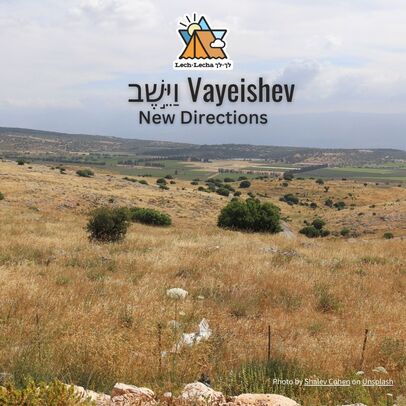
December 7, 2023
וַיֵּ֣שֶׁב
Rabbi Rachmiel Gurwitz,
Director of Programming
This week we read from Parshat Vayeishev, which marks the beginning of Yosef’s incredible life journey. In a wild up-and-down story, there is one small moment that truly changes everything. One day when Yosef’s brothers were out in the fields pasturing their herd, Ya'akov requested that he go find them in Shechem. When Yosef arrives in Shechem, he cannot find them, as the Torah states, “ וְהִנֵּה תֹעֶה בַּשָּׂדֶה - and behold he was wandering in the field” (Bereisheit 37:15).
This is a critical moment.
This could have been an insignificant day.
Yosef could have searched and after not finding his brothers returned home - safe and sound. Yet, instead, he bumps into an “אִישׁ,” a random person, who happens to have seen his brothers head to Dotan, directing Yosef there, where he will be seized by his brothers and sold into slavery and the rest is history.
Though if we zoom in on the verses, we’ll notice that the language of the Torah is more specific, “וַיִּמְצָאֵהוּ אִישׁ - And a certain man found him [Yosef].” Rashi writes that this was actually not a random person, but the angel Gabriel directing him toward his fateful encounter with his brothers.
It is a reminder that every day our lives are filled with small moments that can be passing or revelatory. The story of the אִישׁ (random man) turns our expectations upside down. Perhaps, messengers of the divine are always finding us; always directing us in new directions. So, when we seek out Hashem, we may not need to always discover but simply make ourselves open and receptive to divine experience.
Shabbat Shalom!
וַיֵּ֣שֶׁב
Rabbi Rachmiel Gurwitz,
Director of Programming
This week we read from Parshat Vayeishev, which marks the beginning of Yosef’s incredible life journey. In a wild up-and-down story, there is one small moment that truly changes everything. One day when Yosef’s brothers were out in the fields pasturing their herd, Ya'akov requested that he go find them in Shechem. When Yosef arrives in Shechem, he cannot find them, as the Torah states, “ וְהִנֵּה תֹעֶה בַּשָּׂדֶה - and behold he was wandering in the field” (Bereisheit 37:15).
This is a critical moment.
This could have been an insignificant day.
Yosef could have searched and after not finding his brothers returned home - safe and sound. Yet, instead, he bumps into an “אִישׁ,” a random person, who happens to have seen his brothers head to Dotan, directing Yosef there, where he will be seized by his brothers and sold into slavery and the rest is history.
Though if we zoom in on the verses, we’ll notice that the language of the Torah is more specific, “וַיִּמְצָאֵהוּ אִישׁ - And a certain man found him [Yosef].” Rashi writes that this was actually not a random person, but the angel Gabriel directing him toward his fateful encounter with his brothers.
It is a reminder that every day our lives are filled with small moments that can be passing or revelatory. The story of the אִישׁ (random man) turns our expectations upside down. Perhaps, messengers of the divine are always finding us; always directing us in new directions. So, when we seek out Hashem, we may not need to always discover but simply make ourselves open and receptive to divine experience.
Shabbat Shalom!
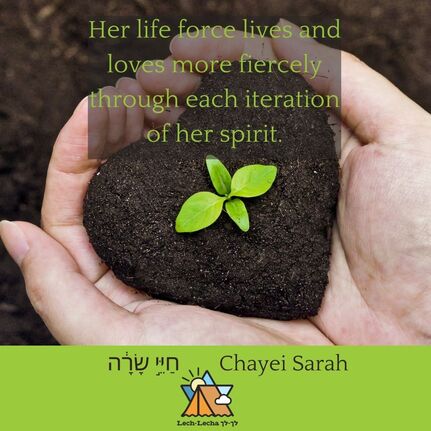
November 9, 2023
חַיֵּ֣י שָׂרָ֔ה
Aura Chaya Gispan, Lech-Lecha Trekker,
2023 White Mountains & Catskills
October 7th marked the conclusion of the Torah reading cycle for the year that was and the beginning of the year that is being unscrolled. Fraught as the day became with the debilitating onslaught of massacres and all of the ensuing devastation, what has characterized this new cycle for me has been the weightiness and import of every “DNA strand” of Torah—whether represented as ink on parchment, or in embodied human form—as a vital and inextricable link in Jewish destiny: each “letter” indispensable to our wholeness, each loss indescribably tragic.
The literality of the text has not been lost on me: from the rude awakening from an “idyllic” lull of Edenic-like holy days to brutality and bombardment from ancient-modern serpentine thinking surreptitiously usurping humanity’s empathy towards a most destructive cause. From nefarious schemes to create global upheaval and literally “flood al Aqsa” to Avraham’s quest to redeem hostages from the clutch of terror. From Yitzchak’s near death experience on the altar of the history his future progeny would endure, to the unbearable losses and existential threats we are (re)experiencing on so many fronts around the world…History seems to be repeating itself so that the Torah portions unravel like predictive iPhone texts, but the Torah portion is actually future-oriented, a narrative of newness.
Unlike dominant discourses that are often recursive, Torah funnels a holistic perspective that offers a collective form of “narrative therapy” characterized by the quality and mandate of Lech-Lecha! Every moment is an opportunity to rescript our history away from limiting beliefs and patterns, towards lasting progress. Staying close to the text can help steer our vision towards a new reality, one of unprecedented goodness and peace. Perhaps when we are utterly familiar with the metaphysical grooves of history we can chart our way into the promised era for all humanity, the destiny we were always charged with. Reaffirming our commitment to reading the Torah portion—not as something separate from our daily experience but as a critical lens and visionary-aid in “how to read” the current unfoldings—can be a powerful anchor to a transcendent power at this turbulent time.
In my own reflections on the Parsha I often linger on the title, saturated as it is with meaningful reverberations. This week in Chayei Sarah our primary matriarch is memorialized through the plethora of expressions her descendants will embody through her many lives--the chapters of which we are still unfurling, still in the throes of birthing the world she endeavored to usher forth. Her life force lives and loves more fiercely through each iteration of her spirit. Just as she stood her holy ground and literally drew lines in the sand to protect her son and the future Jewish people from the violent fantasies and envy of his half-brother Ishmael, so are we being called to hold our steady ground today. The 127 years of Sarah’s life were eventually mapped onto 127 territories when Esther entered the palace with the particular assignment of drawing lines again. Not only did she save her people from the dire threat of total extinction, her progeny enabled our temple to be rebuilt. The parallels are many—countless threads of meaning our shared history is asking you to unravel in the unique way that similar dynamics might be at play in your world. There are no spectators. We are all main actors on a global stage, protecting sacred terrain.
Every one of us is a spark of Sarah, every one of us the embodiment of Esther. The many lives (and determined love) of Sarah continue to be chronicled in the unfurling scroll of our day.
Shabbat Shalom!
חַיֵּ֣י שָׂרָ֔ה
Aura Chaya Gispan, Lech-Lecha Trekker,
2023 White Mountains & Catskills
October 7th marked the conclusion of the Torah reading cycle for the year that was and the beginning of the year that is being unscrolled. Fraught as the day became with the debilitating onslaught of massacres and all of the ensuing devastation, what has characterized this new cycle for me has been the weightiness and import of every “DNA strand” of Torah—whether represented as ink on parchment, or in embodied human form—as a vital and inextricable link in Jewish destiny: each “letter” indispensable to our wholeness, each loss indescribably tragic.
The literality of the text has not been lost on me: from the rude awakening from an “idyllic” lull of Edenic-like holy days to brutality and bombardment from ancient-modern serpentine thinking surreptitiously usurping humanity’s empathy towards a most destructive cause. From nefarious schemes to create global upheaval and literally “flood al Aqsa” to Avraham’s quest to redeem hostages from the clutch of terror. From Yitzchak’s near death experience on the altar of the history his future progeny would endure, to the unbearable losses and existential threats we are (re)experiencing on so many fronts around the world…History seems to be repeating itself so that the Torah portions unravel like predictive iPhone texts, but the Torah portion is actually future-oriented, a narrative of newness.
Unlike dominant discourses that are often recursive, Torah funnels a holistic perspective that offers a collective form of “narrative therapy” characterized by the quality and mandate of Lech-Lecha! Every moment is an opportunity to rescript our history away from limiting beliefs and patterns, towards lasting progress. Staying close to the text can help steer our vision towards a new reality, one of unprecedented goodness and peace. Perhaps when we are utterly familiar with the metaphysical grooves of history we can chart our way into the promised era for all humanity, the destiny we were always charged with. Reaffirming our commitment to reading the Torah portion—not as something separate from our daily experience but as a critical lens and visionary-aid in “how to read” the current unfoldings—can be a powerful anchor to a transcendent power at this turbulent time.
In my own reflections on the Parsha I often linger on the title, saturated as it is with meaningful reverberations. This week in Chayei Sarah our primary matriarch is memorialized through the plethora of expressions her descendants will embody through her many lives--the chapters of which we are still unfurling, still in the throes of birthing the world she endeavored to usher forth. Her life force lives and loves more fiercely through each iteration of her spirit. Just as she stood her holy ground and literally drew lines in the sand to protect her son and the future Jewish people from the violent fantasies and envy of his half-brother Ishmael, so are we being called to hold our steady ground today. The 127 years of Sarah’s life were eventually mapped onto 127 territories when Esther entered the palace with the particular assignment of drawing lines again. Not only did she save her people from the dire threat of total extinction, her progeny enabled our temple to be rebuilt. The parallels are many—countless threads of meaning our shared history is asking you to unravel in the unique way that similar dynamics might be at play in your world. There are no spectators. We are all main actors on a global stage, protecting sacred terrain.
Every one of us is a spark of Sarah, every one of us the embodiment of Esther. The many lives (and determined love) of Sarah continue to be chronicled in the unfurling scroll of our day.
Shabbat Shalom!
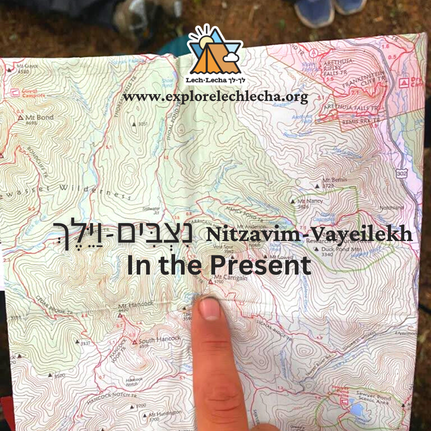
September 7, 2023
נִצְבִּים-וַיֵּלֶךְ
Rachmiel Gurwitz
Director of Partnerships and Special Programs writes:
When a group journeys into the wilderness, everything changes. The daily routine is disrupted, the connection to the digital world is severed and there is a sense of equality of experience that the group shares together. This recipe of enhanced presence and togetherness is not only found in the woods but also in the opening line of this week’s parashah, Nitzavim-Vayeilekh.
אַתֶּם נִצָּבִים הַיּוֹם כֻּלְּכֶם לִפְנֵי ה’ אֱלֹקיכֶם
“You stand today, all of you, before Hashem your G-d...”
Hayom (Today) is mentioned five times throughout the parashah's opening lines. Its repetition is noteworthy, almost like a flashing signal - Hayom, Hayom, Hayom, Hayom, Hayom. There is a melody for the piyut Hayom T’amtzeinu at the end of the Rosh Hashanah service, where Hayom is sung over and over again. In an age of distraction, the call for Hayom has never been stronger.
“All of you” is the other seemingly superfluous phrase in the opening verse. The Hebrew grammar already directs its voice to the community, so the phrase of “all of you” (כֻּלְּכֶם) must serve a bigger purpose. We can find a hint to its purpose in the end of the opening verse when it declares that whether you are an elder or tribal official or the one tasked with chopping wood or collecting water, you stand together as one community with a shared mission - “all of you” (כֻּלְּכֶם).
We read Parashat Nitzavim each year on the Shabbat preceding Rosh Hashanah as a reminder. It reminds us that being present and joining together in community are necessary ingredients for renewing ourselves for the new year. These themes also frame the trek experience. The undeniable feeling of being in the moment - in awe of the mountains and wisdom of the woods - while becoming bonded together as a mini-community working towards a shared goal.
Ultimately, these are challenges for us each and every day, to live in the moment, feel commitment to something bigger than ourselves, and to continue renewing ourselves on our own journey of connection to the world around us, each other and G-d.
Shabbat Shalom!
נִצְבִּים-וַיֵּלֶךְ
Rachmiel Gurwitz
Director of Partnerships and Special Programs writes:
When a group journeys into the wilderness, everything changes. The daily routine is disrupted, the connection to the digital world is severed and there is a sense of equality of experience that the group shares together. This recipe of enhanced presence and togetherness is not only found in the woods but also in the opening line of this week’s parashah, Nitzavim-Vayeilekh.
אַתֶּם נִצָּבִים הַיּוֹם כֻּלְּכֶם לִפְנֵי ה’ אֱלֹקיכֶם
“You stand today, all of you, before Hashem your G-d...”
Hayom (Today) is mentioned five times throughout the parashah's opening lines. Its repetition is noteworthy, almost like a flashing signal - Hayom, Hayom, Hayom, Hayom, Hayom. There is a melody for the piyut Hayom T’amtzeinu at the end of the Rosh Hashanah service, where Hayom is sung over and over again. In an age of distraction, the call for Hayom has never been stronger.
“All of you” is the other seemingly superfluous phrase in the opening verse. The Hebrew grammar already directs its voice to the community, so the phrase of “all of you” (כֻּלְּכֶם) must serve a bigger purpose. We can find a hint to its purpose in the end of the opening verse when it declares that whether you are an elder or tribal official or the one tasked with chopping wood or collecting water, you stand together as one community with a shared mission - “all of you” (כֻּלְּכֶם).
We read Parashat Nitzavim each year on the Shabbat preceding Rosh Hashanah as a reminder. It reminds us that being present and joining together in community are necessary ingredients for renewing ourselves for the new year. These themes also frame the trek experience. The undeniable feeling of being in the moment - in awe of the mountains and wisdom of the woods - while becoming bonded together as a mini-community working towards a shared goal.
Ultimately, these are challenges for us each and every day, to live in the moment, feel commitment to something bigger than ourselves, and to continue renewing ourselves on our own journey of connection to the world around us, each other and G-d.
Shabbat Shalom!

July 12, 2023
מטות מסעי
- Nadav Slovin
Discover the Divine Within
by Nadav Slovin
I never understood why idol worship is such a big deal. It’s hard to respect a boss who demands respect. What’s more, I never understood how G-d’s oneness and its flipside of rejecting idol worship are the foundation for the ethical injunctions of the Torah – caring for the poor, widow, orphan, and stranger.
Our Parasha lends a hand.
There is a fascinating Torah relating the Israelites’ wanderings in the desert enumerated in our Parasha, Mas’ei, to idolatry.
Rebbe Nachman teaches that the purpose of these 42 journeys was to cleanse their inclination towards idol worship. The primary emotion of idolatry, he describes, is anger, and this, too, is calmed through the expeditions (Likutei Moharan 2:62). What is the relationship between journeying and cleansing idolatry? What is the relationship between idol worship and anger? I was intrigued.
Only through my own journey, did I merit understanding.
I spent many years seeking. Seeking answers, guidance, a path, a truth, a savior. I traveled west, east, into religions, meditations, communities, and ideologies. Many of my journeys concluded in disappointment, judgment, and anger. This community doesn’t have it, this ideology does not hold the truth, and this person is not my savior. Indeed, the Ba’al Shem Tov teaches that the journeys of the Jewish people "reflect the journeys of each and every individual” (Ba’al Shem Tov, Mas’ei, 1:3).
Ultimately, like the Israelites, my journeys lead to one destination: no place, no people, no substance, no savior hold that which I seek. Our travels guide us to one place alone: inward. What is idol worship? “You shall have no other gods before Me” (Shmot 20:2). Rashi explains, have no god who is an “other” to you. The first and final place to meet G-d is within. When we seek G-d without, when we fall into idolatry and tumble in anger as no one and nothing succeed in solving my challenges and quenching my thirst.
Rebbe Nachman shares a story of a man, Shloimeleh, who dreams over and over of a treasure buried under a bridge. Eventually, he travels miles and miles in search. Finding the bridge, he begins to dig. A soldier sees him and scoffs. Fool! You search for the buried treasure of your dreams? I, too, dreamt of a treasure buried under a shack of a poor Shloimeleh - do you think I was foolish enough to travel miles in search of fairy tales? Shloimeleh returned to find the buried treasure beneath his own home.
May we blessed to journey, to rid ourselves of the notion that our answers can be found from without, to cleanse ourselves of the anger we hold towards all the saviors and ideologies that have disappointed us, and may we come to the holy land of Israel, the holy land of internal connection with the G-d found within each and every one of us.
מטות מסעי
- Nadav Slovin
Discover the Divine Within
by Nadav Slovin
I never understood why idol worship is such a big deal. It’s hard to respect a boss who demands respect. What’s more, I never understood how G-d’s oneness and its flipside of rejecting idol worship are the foundation for the ethical injunctions of the Torah – caring for the poor, widow, orphan, and stranger.
Our Parasha lends a hand.
There is a fascinating Torah relating the Israelites’ wanderings in the desert enumerated in our Parasha, Mas’ei, to idolatry.
Rebbe Nachman teaches that the purpose of these 42 journeys was to cleanse their inclination towards idol worship. The primary emotion of idolatry, he describes, is anger, and this, too, is calmed through the expeditions (Likutei Moharan 2:62). What is the relationship between journeying and cleansing idolatry? What is the relationship between idol worship and anger? I was intrigued.
Only through my own journey, did I merit understanding.
I spent many years seeking. Seeking answers, guidance, a path, a truth, a savior. I traveled west, east, into religions, meditations, communities, and ideologies. Many of my journeys concluded in disappointment, judgment, and anger. This community doesn’t have it, this ideology does not hold the truth, and this person is not my savior. Indeed, the Ba’al Shem Tov teaches that the journeys of the Jewish people "reflect the journeys of each and every individual” (Ba’al Shem Tov, Mas’ei, 1:3).
Ultimately, like the Israelites, my journeys lead to one destination: no place, no people, no substance, no savior hold that which I seek. Our travels guide us to one place alone: inward. What is idol worship? “You shall have no other gods before Me” (Shmot 20:2). Rashi explains, have no god who is an “other” to you. The first and final place to meet G-d is within. When we seek G-d without, when we fall into idolatry and tumble in anger as no one and nothing succeed in solving my challenges and quenching my thirst.
Rebbe Nachman shares a story of a man, Shloimeleh, who dreams over and over of a treasure buried under a bridge. Eventually, he travels miles and miles in search. Finding the bridge, he begins to dig. A soldier sees him and scoffs. Fool! You search for the buried treasure of your dreams? I, too, dreamt of a treasure buried under a shack of a poor Shloimeleh - do you think I was foolish enough to travel miles in search of fairy tales? Shloimeleh returned to find the buried treasure beneath his own home.
May we blessed to journey, to rid ourselves of the notion that our answers can be found from without, to cleanse ourselves of the anger we hold towards all the saviors and ideologies that have disappointed us, and may we come to the holy land of Israel, the holy land of internal connection with the G-d found within each and every one of us.

May 18, 2023
במדבר
- Nadav Slovin
Together I am Whole
by Nadav Slovin
Year after year I am touched by the classic yet essential takeaway associated with Parashat Bamidbar, kicking off the fourth book of the Torah: YOU COUNT reverberates through every verse as Hashem counts our people again and again. Like a mother counting her children, a shepherd counting her flock, there is a sweetness to the obsession, a loving rhythm sung in the seeming superfluousness of the continuous count.
Yet this year I am struck by an additional undertone softly strumming our parashah’s melody: You… don’t count?
See, the numbers repeatedly intoned are large, tribal, and round: 45,650 in the tribe of Gad, 74,600 in Yehuda. The roundedness implies the individual’s submergence within the whole, their significance but a product of tribal, communal, and familial association. What do we make of this?
If our generation is anything like me, we are *thirsty* for belonging. More than tragic, the idealization of independence at the cost of family and community is dangerous. Our individual counting is a product of our association with a Whole beyond our limited selves. Just as the fulfillment of our individual pursuits is dependent on the street pavers, truck drives, grocery works, teachers, bankers, etc., our emotional and spiritual pursuits must link up with the long intergenerational process and wide communal pursuit of becoming, educating, loving, supporting, willing, and protecting in order to be fulfilled.
We can feign independence within the four walls of our homes and the four corners of our phones. Not so in the wilderness. Our interdependence is clear, our individual weakness is embraced as an opportunity to connect without, our association with the group natural and enlivening. May we be blessed to know that our true counting is when we are counted together.
Shabbat Shalom!
במדבר
- Nadav Slovin
Together I am Whole
by Nadav Slovin
Year after year I am touched by the classic yet essential takeaway associated with Parashat Bamidbar, kicking off the fourth book of the Torah: YOU COUNT reverberates through every verse as Hashem counts our people again and again. Like a mother counting her children, a shepherd counting her flock, there is a sweetness to the obsession, a loving rhythm sung in the seeming superfluousness of the continuous count.
Yet this year I am struck by an additional undertone softly strumming our parashah’s melody: You… don’t count?
See, the numbers repeatedly intoned are large, tribal, and round: 45,650 in the tribe of Gad, 74,600 in Yehuda. The roundedness implies the individual’s submergence within the whole, their significance but a product of tribal, communal, and familial association. What do we make of this?
If our generation is anything like me, we are *thirsty* for belonging. More than tragic, the idealization of independence at the cost of family and community is dangerous. Our individual counting is a product of our association with a Whole beyond our limited selves. Just as the fulfillment of our individual pursuits is dependent on the street pavers, truck drives, grocery works, teachers, bankers, etc., our emotional and spiritual pursuits must link up with the long intergenerational process and wide communal pursuit of becoming, educating, loving, supporting, willing, and protecting in order to be fulfilled.
We can feign independence within the four walls of our homes and the four corners of our phones. Not so in the wilderness. Our interdependence is clear, our individual weakness is embraced as an opportunity to connect without, our association with the group natural and enlivening. May we be blessed to know that our true counting is when we are counted together.
Shabbat Shalom!

May 10, 2023
בהר
- Nadav Slovin
The Courage to Be Vulnerable
“I’m all set” is the doom of genuine relationships of interdependence.
I must have been 20 when I had the realization. Up until then I romanticized independence. Have you ever visited a friend, who offers you some tea, and a cookie, too? “Oh no,” you politely respond, “I’m all set, thank you so much.” And right there, in three short words, the door of connection is shut.
For me the realization came when speaking to my parents. For years “I’m all set!” was my motto and “I” was my god. I don’t need your money, your advice, not your love nor your rice, I managed to delude myself. One day as I spoke with them on the phone I was faced with a broken silence of disconnection. What was there to say? “I started dating someone but I have my reserves. What do you think?” In an instant the floodgates unfurled. A relationship depends on vulnerability, I realized.
Independence is a dangerous fallacy built upon narcissistic foundations weaker than a strand of hair. As the daily blessing after eating fruit, veggies, dairy, meat, and more so wisely reminds, בורא נפשות רבות וחסרונן על כל מה שבראת להחיות בהם נפש כל חי, creator of many souls and their lack, in order that the soul of all life will live through them. Only through our lacking are we able to invite the other in, only through our needs can we connect to the unity of all.
Pharaoh king of Egypt feigned perfection, relieving himself only in the Nile where no one could see. It makes sense, then, that Pharaoh did not know Hashem: “״,לא ידעתי את ה I don’t know YHVH, he proclaimed, I am disconnected from the One (Shemot 5:2). Others have thought they are the one son of G-d, but the claim is anathema to our cause. We are all equally the children of G-d, and the greatest expression of this truth is our lacking, for G-d’s first and primary act in creating life is that of צמצום, stepping back and making room for the other. Perfection is not the image of G-d. And this is the essence of Shmita detailed in our Parasha, Behar, the seventh jubilee year that demands our vulnerability. We are not in control nor perfect; this is our strength.
בהר
- Nadav Slovin
The Courage to Be Vulnerable
“I’m all set” is the doom of genuine relationships of interdependence.
I must have been 20 when I had the realization. Up until then I romanticized independence. Have you ever visited a friend, who offers you some tea, and a cookie, too? “Oh no,” you politely respond, “I’m all set, thank you so much.” And right there, in three short words, the door of connection is shut.
For me the realization came when speaking to my parents. For years “I’m all set!” was my motto and “I” was my god. I don’t need your money, your advice, not your love nor your rice, I managed to delude myself. One day as I spoke with them on the phone I was faced with a broken silence of disconnection. What was there to say? “I started dating someone but I have my reserves. What do you think?” In an instant the floodgates unfurled. A relationship depends on vulnerability, I realized.
Independence is a dangerous fallacy built upon narcissistic foundations weaker than a strand of hair. As the daily blessing after eating fruit, veggies, dairy, meat, and more so wisely reminds, בורא נפשות רבות וחסרונן על כל מה שבראת להחיות בהם נפש כל חי, creator of many souls and their lack, in order that the soul of all life will live through them. Only through our lacking are we able to invite the other in, only through our needs can we connect to the unity of all.
Pharaoh king of Egypt feigned perfection, relieving himself only in the Nile where no one could see. It makes sense, then, that Pharaoh did not know Hashem: “״,לא ידעתי את ה I don’t know YHVH, he proclaimed, I am disconnected from the One (Shemot 5:2). Others have thought they are the one son of G-d, but the claim is anathema to our cause. We are all equally the children of G-d, and the greatest expression of this truth is our lacking, for G-d’s first and primary act in creating life is that of צמצום, stepping back and making room for the other. Perfection is not the image of G-d. And this is the essence of Shmita detailed in our Parasha, Behar, the seventh jubilee year that demands our vulnerability. We are not in control nor perfect; this is our strength.
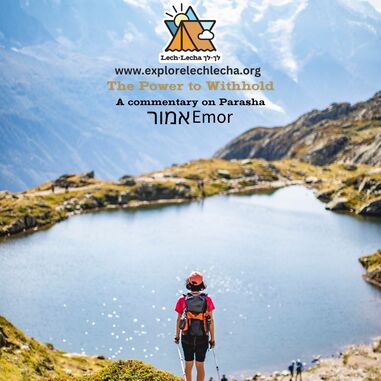
May 3, 2023
אמור
- Nadav Slovin
The Power to Withhold
"For a hundred years or more, every textbook of psychology and psychotherapy has advised that some method of talking about distressing feelings can resolve them. However, as we’ve seen, the experience of trauma itself gets in the way of being able to do that. No matter how much insight and understanding we develop, the rational brain is basically impotent to talk the emotional brain out of its own reality."
This moving description of language’s limits written by Dr. Bessel Van Der Kolk, one of today’s most innovative psychological researchers, is echoed by the process towards revelation at Sinai that is spoken of in this week’s Parasha, Emor.
Excerpts paint a limited picture, and indeed Dr. Van Der Kolk, too, utilizes and promotes the use of “talk therapy” as an essential stage of a healing process towards becoming one’s best self. Our people’s healing process begins with words, as well. Pesach, Passover, combines two words: Pe Sach, a speaking mouth, our sages point out (Arizal, Pri Eitz Chaim, Shaar Mikrah Kodesh, ch. 4). The focal mitzvah of the holiday is to tell our story, סיפור יציאת מצרים, a verbal journey into memory, integration, and identity.
But the process doesn’t stop there. Shavuot, the holiday of receiving Torah 51 days after Passover’s start, is a holiday of silence. You see, Gd’s repeated pivotal instruction prior to receiving Torah is שמע, listen.
This is the process of Counting the Omer discussed in our Parasha, the transformation from speech to silence.
Speaking can only go so far, to remind me of who I am, to guide me towards. Speaking is always in the past - even if projected into the future, I am expressing a thought from a moment past. Yet there is a presence that we can achieve in the silence that speech cannot achieve. Built upon speech that directs me towards awareness and understanding, silence is the language of intimate present encounter. So, too, Passover’s speech guides us to believing that we are loved in relationship with God, while Shavuot is the receiving produced through the silent act of listening - שמע.
We live in a society inundated with speech - text, whatsapp, email, phone, news, etc. Hopefully some of the speech that we take part in reminds us of our holiness and our meaningful relationship with G-d. But it is vital that we take time to step out of the world of words, to step into the silence of the wilderness, into the opportunity to hear, receive, and renew.
אמור
- Nadav Slovin
The Power to Withhold
"For a hundred years or more, every textbook of psychology and psychotherapy has advised that some method of talking about distressing feelings can resolve them. However, as we’ve seen, the experience of trauma itself gets in the way of being able to do that. No matter how much insight and understanding we develop, the rational brain is basically impotent to talk the emotional brain out of its own reality."
This moving description of language’s limits written by Dr. Bessel Van Der Kolk, one of today’s most innovative psychological researchers, is echoed by the process towards revelation at Sinai that is spoken of in this week’s Parasha, Emor.
Excerpts paint a limited picture, and indeed Dr. Van Der Kolk, too, utilizes and promotes the use of “talk therapy” as an essential stage of a healing process towards becoming one’s best self. Our people’s healing process begins with words, as well. Pesach, Passover, combines two words: Pe Sach, a speaking mouth, our sages point out (Arizal, Pri Eitz Chaim, Shaar Mikrah Kodesh, ch. 4). The focal mitzvah of the holiday is to tell our story, סיפור יציאת מצרים, a verbal journey into memory, integration, and identity.
But the process doesn’t stop there. Shavuot, the holiday of receiving Torah 51 days after Passover’s start, is a holiday of silence. You see, Gd’s repeated pivotal instruction prior to receiving Torah is שמע, listen.
This is the process of Counting the Omer discussed in our Parasha, the transformation from speech to silence.
Speaking can only go so far, to remind me of who I am, to guide me towards. Speaking is always in the past - even if projected into the future, I am expressing a thought from a moment past. Yet there is a presence that we can achieve in the silence that speech cannot achieve. Built upon speech that directs me towards awareness and understanding, silence is the language of intimate present encounter. So, too, Passover’s speech guides us to believing that we are loved in relationship with God, while Shavuot is the receiving produced through the silent act of listening - שמע.
We live in a society inundated with speech - text, whatsapp, email, phone, news, etc. Hopefully some of the speech that we take part in reminds us of our holiness and our meaningful relationship with G-d. But it is vital that we take time to step out of the world of words, to step into the silence of the wilderness, into the opportunity to hear, receive, and renew.
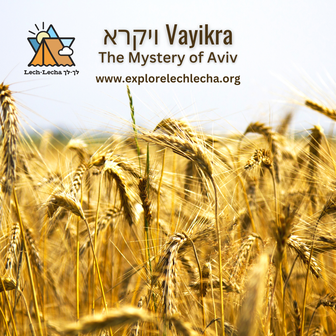
March 22, 2023
ויקרא
- Nadav Slovin
Happy New Year!
Indeed, Tishrei’s Rosh Hashanah is not the only new year among our people. Nissan is, too.
What is the unique flavor of Nissan’s renewal?
This mystery is hidden within the second name for this month: Aviv.
Aviv has various meanings. Two hold particular prominence among the commentators. For one, Aviv means ripe, referring to grains’ spring ripening. Famously, though, Aviv is also a combination of the worlds אב, father, and י״ב, the numerical value of 12 in reference to the twelves months of the year. Aviv is the progenitor, the initiator of the twelve months of the year.
Curious, is it not? Aviv is the first, yet it is a father already grown. Aviv is a new beginning, yet it is marked by grain standing in completion.
It is well known that Tishrei, the month that begins with Rosh Hashanah marks the birth of the world. Life created from scratch. Nissan (Aviv), however, marks the birth of the Jewish people. Nissan, the month of our redemption from Egypt, records the transformation of adults into children once again, guided into the desert in order to mature into a loving family.
You see, there are two primary types of renewal: one is the birth of a child; sweet as Rosh Hashanah’s apples and honey, pure as the white of Yom Kippur. The second, and on a certain level even deeper renewal, is the rebirth of an adult; bitter as marror and dry as the matzah bread. A rebirth of standing tall yet choosing to be small, humbly letting go of the teacher’s hat to become the student once again, effortfully kneading the ego’s dough as you embark into the unknown and unrehearsed.
May we be blessed with the courage to leave the elements of our adult lives that enslave us this Nissan and this Passover, humbly choosing to be born again.
Happy New Year and Chodesh Tov!
ויקרא
- Nadav Slovin
Happy New Year!
Indeed, Tishrei’s Rosh Hashanah is not the only new year among our people. Nissan is, too.
What is the unique flavor of Nissan’s renewal?
This mystery is hidden within the second name for this month: Aviv.
Aviv has various meanings. Two hold particular prominence among the commentators. For one, Aviv means ripe, referring to grains’ spring ripening. Famously, though, Aviv is also a combination of the worlds אב, father, and י״ב, the numerical value of 12 in reference to the twelves months of the year. Aviv is the progenitor, the initiator of the twelve months of the year.
Curious, is it not? Aviv is the first, yet it is a father already grown. Aviv is a new beginning, yet it is marked by grain standing in completion.
It is well known that Tishrei, the month that begins with Rosh Hashanah marks the birth of the world. Life created from scratch. Nissan (Aviv), however, marks the birth of the Jewish people. Nissan, the month of our redemption from Egypt, records the transformation of adults into children once again, guided into the desert in order to mature into a loving family.
You see, there are two primary types of renewal: one is the birth of a child; sweet as Rosh Hashanah’s apples and honey, pure as the white of Yom Kippur. The second, and on a certain level even deeper renewal, is the rebirth of an adult; bitter as marror and dry as the matzah bread. A rebirth of standing tall yet choosing to be small, humbly letting go of the teacher’s hat to become the student once again, effortfully kneading the ego’s dough as you embark into the unknown and unrehearsed.
May we be blessed with the courage to leave the elements of our adult lives that enslave us this Nissan and this Passover, humbly choosing to be born again.
Happy New Year and Chodesh Tov!

March 13, 2023
ויקהל
- Nadav Slovin
It's pretty easy to imagine flying, but taking flight is much harder.
Parashat Vayakhel begs the famous question: Why does the Torah repeat the details of the construction of the mishkan, G-d’s dwelling place, so many times?
Indeed this question opens the doors to layers of understanding and insight, but I’d like to focus on the most simple understanding. The first description in Parashat Terumah is the command or intention to build, while this week’s Parashah is the construction and manifestation.
The lesson is simple but extraordinarily relevant for our generation. It is one thing to envision. It is an entirely different thing to perform and embody with precision. Often philosophies and ideologies look, sound, and feel so delicious from without, but when ingested, when enacted, they can be tasteless or bitter. Within every word of our parashah lies intense anticipation: will it stand? This is the question that each of us has to ask ourselves in our generation: will it stand? Can my vision of the world and our people truly stand through the stormy winds of exile, from generation to generation, leading the world to Shalom?
May we be blessed to put our visions to the test. May we have the courage to ask if it will stand. May we do everything in our power to manifest our dreams into reality. And may Hashem provide us the wisdom to know when to rethink.
ויקהל
- Nadav Slovin
It's pretty easy to imagine flying, but taking flight is much harder.
Parashat Vayakhel begs the famous question: Why does the Torah repeat the details of the construction of the mishkan, G-d’s dwelling place, so many times?
Indeed this question opens the doors to layers of understanding and insight, but I’d like to focus on the most simple understanding. The first description in Parashat Terumah is the command or intention to build, while this week’s Parashah is the construction and manifestation.
The lesson is simple but extraordinarily relevant for our generation. It is one thing to envision. It is an entirely different thing to perform and embody with precision. Often philosophies and ideologies look, sound, and feel so delicious from without, but when ingested, when enacted, they can be tasteless or bitter. Within every word of our parashah lies intense anticipation: will it stand? This is the question that each of us has to ask ourselves in our generation: will it stand? Can my vision of the world and our people truly stand through the stormy winds of exile, from generation to generation, leading the world to Shalom?
May we be blessed to put our visions to the test. May we have the courage to ask if it will stand. May we do everything in our power to manifest our dreams into reality. And may Hashem provide us the wisdom to know when to rethink.
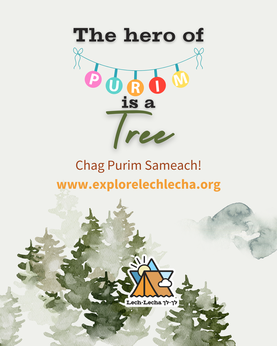
March 6, 2023
פורים, כי תשא
- Nadav Slovin
Who is the primary protagonist of the Purim story? Some would say Esther, others Mordechai, and of course Hashem behind it all. But my opinion? It’s clear: Purim’s hero is a tree.
A harrowing sight, Haman’s tree stood 75 feet tall, evilly awaiting Mordechai’s demise. There is a beautiful midrash about this terrifying tree. What would you expect of the personification of this tree through the creative words of our sages? Maybe it’s the tree of good and evil, maybe the tree that covered Jonah but vanished with the flash of an eye, a punishing, merciless tree. The midrash suggests otherwise. The fig, grape vine, olive, apple, willow tree and more vied for the honor of being the tree through whom Israel’s redemption would eventually come. A wonder - why would these trees want to put themselves in the hands of evil for the sake of eventual redemption?
For many of us, our mental and emotional work involves working our way out of the difficult situations and emotional states in which we find ourselves. Some, though, have the courage to put themselves into challenging encounters, knowing that the fruits that they will glean in the end will be worth the temporary pain. As Rebbe Nachman teaches so often, “ירידה לצורך עליה,” “every ascent first requires a descent.” And so it was, the trees contended for the honor of serving as the pawn for Haman’s evil plan, knowing that they would be the seeds of redemption in the end.
This Purim, may we be blessed with the courage of the trees, with the willingness to face and even seek challenges, within and without, knowing that they are the seeds of adventure and joy.
The third chapter of Masechet Megillah takes a sudden shift from Purim to discuss the laws of a Beit Kenesset, the gathering house that we know of as a shul or synagogue. What does a shul have to do with Purim? Haman’s entreaty to Achashverosh to wipe out the Jews begins with curious description: עם אחד מפזר ומפרד בין העמים, one nation scattered and dispersed among the nations. In contrast, Esther requests of Mordechai prior to braving entry to the king: לך כנוס את כל היהודים, go and gather (kenos) all of the Jews. When scattered we are in danger of hateful and doubting forces from without and within. When gathered together we are invincible.
Thank you for continuing to support Lech-Lecha’s efforts to gather the Jewish people together to grow, learn, and connect.
פורים, כי תשא
- Nadav Slovin
Who is the primary protagonist of the Purim story? Some would say Esther, others Mordechai, and of course Hashem behind it all. But my opinion? It’s clear: Purim’s hero is a tree.
A harrowing sight, Haman’s tree stood 75 feet tall, evilly awaiting Mordechai’s demise. There is a beautiful midrash about this terrifying tree. What would you expect of the personification of this tree through the creative words of our sages? Maybe it’s the tree of good and evil, maybe the tree that covered Jonah but vanished with the flash of an eye, a punishing, merciless tree. The midrash suggests otherwise. The fig, grape vine, olive, apple, willow tree and more vied for the honor of being the tree through whom Israel’s redemption would eventually come. A wonder - why would these trees want to put themselves in the hands of evil for the sake of eventual redemption?
For many of us, our mental and emotional work involves working our way out of the difficult situations and emotional states in which we find ourselves. Some, though, have the courage to put themselves into challenging encounters, knowing that the fruits that they will glean in the end will be worth the temporary pain. As Rebbe Nachman teaches so often, “ירידה לצורך עליה,” “every ascent first requires a descent.” And so it was, the trees contended for the honor of serving as the pawn for Haman’s evil plan, knowing that they would be the seeds of redemption in the end.
This Purim, may we be blessed with the courage of the trees, with the willingness to face and even seek challenges, within and without, knowing that they are the seeds of adventure and joy.
The third chapter of Masechet Megillah takes a sudden shift from Purim to discuss the laws of a Beit Kenesset, the gathering house that we know of as a shul or synagogue. What does a shul have to do with Purim? Haman’s entreaty to Achashverosh to wipe out the Jews begins with curious description: עם אחד מפזר ומפרד בין העמים, one nation scattered and dispersed among the nations. In contrast, Esther requests of Mordechai prior to braving entry to the king: לך כנוס את כל היהודים, go and gather (kenos) all of the Jews. When scattered we are in danger of hateful and doubting forces from without and within. When gathered together we are invincible.
Thank you for continuing to support Lech-Lecha’s efforts to gather the Jewish people together to grow, learn, and connect.
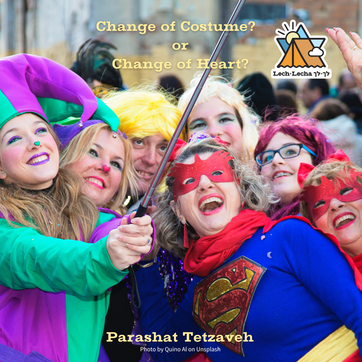
March 3, 2023
תצוה
- Nadav Slovin
Change of Clothing? or Change of Heart?
Correct me if I’m wrong, but humans are the only creatures on earth who wear clothing. Aside from the occasional hat-wearing Koala, of course.
On the face of it, clothing is a bad thing, a sign of human brokenness, its advent coming only after Adam & Eve’s sinful eating of the tree, an indication of separateness, shame, and hiding.
So why is clothing the central topic of our parasha, parashat Tetzaveh, as it elaborately describes the ornate clothing with which the Cohanim served in the mishkan?
Our parasha is one in which clothing not only transcends its original sinful connotations but strides even past its seeming neutrality and reaches into the highest levels of holiness.
What defines holy clothing as opposed to that of shame?
Purim. On Purim as in the Mishkan our clothing invites, drawing the other into relationship as it propels us on a process of getting to know that which is below the skin, within. Adam and Eve sought to hide, Holy clothing seeks to reveal one’s essence.
תצוה
- Nadav Slovin
Change of Clothing? or Change of Heart?
Correct me if I’m wrong, but humans are the only creatures on earth who wear clothing. Aside from the occasional hat-wearing Koala, of course.
On the face of it, clothing is a bad thing, a sign of human brokenness, its advent coming only after Adam & Eve’s sinful eating of the tree, an indication of separateness, shame, and hiding.
So why is clothing the central topic of our parasha, parashat Tetzaveh, as it elaborately describes the ornate clothing with which the Cohanim served in the mishkan?
Our parasha is one in which clothing not only transcends its original sinful connotations but strides even past its seeming neutrality and reaches into the highest levels of holiness.
What defines holy clothing as opposed to that of shame?
Purim. On Purim as in the Mishkan our clothing invites, drawing the other into relationship as it propels us on a process of getting to know that which is below the skin, within. Adam and Eve sought to hide, Holy clothing seeks to reveal one’s essence.
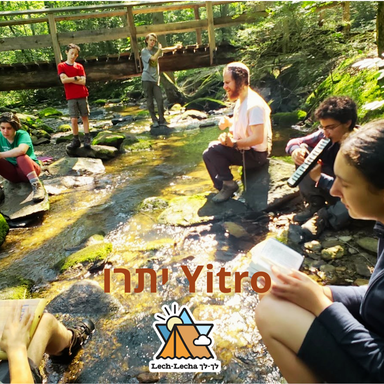
February 9, 2023
יתרו
- Nadav Slovin
Simmer Down
An ancient messianic vision has always surprised me. The description of peace at the time of King Shlomo is often taken to be a vision for the future: “everyone under his own vine and under his own fig tree,” ״אִ֣ישׁ תַּ֤חַת גַּפְנוֹ֙ וְתַ֣חַת תְּאֵנָת֔וֹ (1)״ A parable for consciousness, there will come a day when each of us will clearly understand our purpose and life’s essence without dependence upon those around us. Is this an ideal? Would not such an independence make way for loneliness? This week’s parsha has finally helped me to understand.
One of my favorite teachings from our tradition brought down in the Talmud is that a teacher is not to sit on a higher level than their students. (2) The same lesson is clearly taught in our parsha: why do you sit while the people stand before you waiting for guidance, Moshe’s father-in-law Yitro rebukes. (3)
These teachings reach far beyond physical logistics. You know what is the most venerable term for a wise individual in our tradition? Not teacher, not Rabbi; Talmid Chacham, a wise student. See, the best teacher is the best student, teaching us not what to learn but how to learn. If I’m sitting and you’re standing, how are you going to teach me how to rise up? Sit with me and let me watch and rise with you.
On the deepest level, this is the way in which God teaches us as well. Do you know how Avraham learned the Torah? He learned it from his kidneys. (4) God doesn’t want to teach us from above, displaying overwhelming wonders that sweep us off our feet and rip us of our free will. Indeed it was necessary at times, but the goal, and the role of our generation - to learn our truth and the ways of One at our own level. We discover that within me, at exactly my level, God sits and learns with me as we grow together on our shared journey of becoming.
I have found this is the learning that nature facilitates. Its simplicity invites my growth as I am able to meet God within my unassuming surroundings at my own level, my own pace, my own rhythm. What’s incredible, each of us, each trekker, moves to their own beat, receiving their unique lessons from the same, humble, wise surroundings that wake up their reflection within me. “Everyone under his own vine and under his own fig tree.” This messianic vision is the opposite of loneliness. It is a Lech-Lecha trek. It is a journey that we embark upon together in which each individual is able to progress at their own pace, singing their own niggun (melody), empowered by peers to locate the motivated within rather than told or taught from above.
יתרו
- Nadav Slovin
Simmer Down
An ancient messianic vision has always surprised me. The description of peace at the time of King Shlomo is often taken to be a vision for the future: “everyone under his own vine and under his own fig tree,” ״אִ֣ישׁ תַּ֤חַת גַּפְנוֹ֙ וְתַ֣חַת תְּאֵנָת֔וֹ (1)״ A parable for consciousness, there will come a day when each of us will clearly understand our purpose and life’s essence without dependence upon those around us. Is this an ideal? Would not such an independence make way for loneliness? This week’s parsha has finally helped me to understand.
One of my favorite teachings from our tradition brought down in the Talmud is that a teacher is not to sit on a higher level than their students. (2) The same lesson is clearly taught in our parsha: why do you sit while the people stand before you waiting for guidance, Moshe’s father-in-law Yitro rebukes. (3)
These teachings reach far beyond physical logistics. You know what is the most venerable term for a wise individual in our tradition? Not teacher, not Rabbi; Talmid Chacham, a wise student. See, the best teacher is the best student, teaching us not what to learn but how to learn. If I’m sitting and you’re standing, how are you going to teach me how to rise up? Sit with me and let me watch and rise with you.
On the deepest level, this is the way in which God teaches us as well. Do you know how Avraham learned the Torah? He learned it from his kidneys. (4) God doesn’t want to teach us from above, displaying overwhelming wonders that sweep us off our feet and rip us of our free will. Indeed it was necessary at times, but the goal, and the role of our generation - to learn our truth and the ways of One at our own level. We discover that within me, at exactly my level, God sits and learns with me as we grow together on our shared journey of becoming.
I have found this is the learning that nature facilitates. Its simplicity invites my growth as I am able to meet God within my unassuming surroundings at my own level, my own pace, my own rhythm. What’s incredible, each of us, each trekker, moves to their own beat, receiving their unique lessons from the same, humble, wise surroundings that wake up their reflection within me. “Everyone under his own vine and under his own fig tree.” This messianic vision is the opposite of loneliness. It is a Lech-Lecha trek. It is a journey that we embark upon together in which each individual is able to progress at their own pace, singing their own niggun (melody), empowered by peers to locate the motivated within rather than told or taught from above.
מלכים א ה ה 1
2 מגילה כ״א א:ט״ו, רמב״ם משנה תורה הלכות תלמוד תורה ד ב
3 שמות יח יד
4 בראשית רבה פרשה צה אות ג
2 מגילה כ״א א:ט״ו, רמב״ם משנה תורה הלכות תלמוד תורה ד ב
3 שמות יח יד
4 בראשית רבה פרשה צה אות ג

February 1, 2023
בשלח
- Nadav Slovin
Turn up the Volume of Our Soul Song
What is it about a song that draws tears to our eyes, raises our spirits to life, and opens our hearts to oneness and love?
What is it about a song that is so different from mere words, giving expression to the mysteries of the soul?
This week is named Shabbat Shira, the Shabbat of Song, after the song of the sea sung as our ancestors finally found freedom on the other side of the sea.
The song's first words reveal the mysterious magic of song: אז ישיר, Az Yashir, "then he will sing." Our ancestors teach in the midrash that the song's future orientation hints to a time in which all life will live at once and as one, when the differentiating forces of time and space will be dissolved into the Oneness at their source. The wondrous love demonstrated in the miraculous splitting of the sea and redemption of our people tapped us into our timeless truth - we are loved, the world is full of love, each generation holding hands in a chain of meaningful connection from the first moment to the last.
You cannot hear two people speaking at once, yet two voices in song can create harmony. A debate of words has a winner and loser, yet a debate of song is an interdependent dance swirling and twirling in timeless connection. Two moments cannot overlap in the logical progression of a sentence, yet a song transports us into a spiral of interlaced moments blurring time's direction.
May we be blessed with a Shabbat of Song whose notes we let carry us into a time beyond time, whose melodies move us to feel the future when all life will live at once and as one in the now.
בשלח
- Nadav Slovin
Turn up the Volume of Our Soul Song
What is it about a song that draws tears to our eyes, raises our spirits to life, and opens our hearts to oneness and love?
What is it about a song that is so different from mere words, giving expression to the mysteries of the soul?
This week is named Shabbat Shira, the Shabbat of Song, after the song of the sea sung as our ancestors finally found freedom on the other side of the sea.
The song's first words reveal the mysterious magic of song: אז ישיר, Az Yashir, "then he will sing." Our ancestors teach in the midrash that the song's future orientation hints to a time in which all life will live at once and as one, when the differentiating forces of time and space will be dissolved into the Oneness at their source. The wondrous love demonstrated in the miraculous splitting of the sea and redemption of our people tapped us into our timeless truth - we are loved, the world is full of love, each generation holding hands in a chain of meaningful connection from the first moment to the last.
You cannot hear two people speaking at once, yet two voices in song can create harmony. A debate of words has a winner and loser, yet a debate of song is an interdependent dance swirling and twirling in timeless connection. Two moments cannot overlap in the logical progression of a sentence, yet a song transports us into a spiral of interlaced moments blurring time's direction.
May we be blessed with a Shabbat of Song whose notes we let carry us into a time beyond time, whose melodies move us to feel the future when all life will live at once and as one in the now.
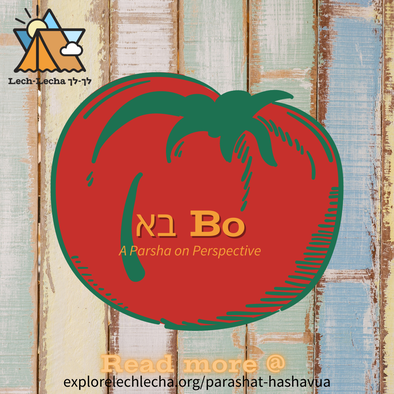
January 25, 2023
בא
- Nadav Slovin
The tomato: is it a fruit or a vegetable?
A question that has haunted humanity from time immemorial.
A question that holds within it the deepest secrets of the universe.
A question about which this week’s parsha, Parashat Bo, has much to say.
Parashat Bo is one of the most important in the entire Torah, the parsha about which our great sage Rashi wrote that the Torah should seemingly begin; the parsha in which our ancestors form into a people for the first time; and the parsha in which we receive our first mitzvah, our first opportunity to become a tzevet, a partner with G-d.
The first mitzvah: sanctifying the new month. החודש הזה לכםת, this month is yours, says Hashem. Say what? This month is ours? The cycles of the moon couldn’t be more beyond human control and ownership - how could this month be ours?
Indeed, this is exactly the depth of this mitzvah, the first mitzvah that characterizes our people’s purpose in the world: Just as we have no ownership over the moon’s cycles, in truth, we have no ownership over anything. Not over the land upon which we dwell nor the cars in which we drive, not over the clothing on our back nor even, at the end of the day, our back itself. The only ownership we have is the most challenging ownership of all, the focal point of our life’s work: owning our perspective.
How do we see the world? Do we love or do we hate, collaborate or compete, witness or judge? We are not in control, but we are deeply empowered. The moon does not need our control, nor do our friends, our children, or our bodies. They need our witnessing, our noticing, our appreciation, and our love.
So, is a tomato a fruit or a vegetable?
It’s both, because I witness it one way and you witness it in the other. What matters most is that we are able to eat it together as dear friends.
-Shabbat Shalom.
בא
- Nadav Slovin
The tomato: is it a fruit or a vegetable?
A question that has haunted humanity from time immemorial.
A question that holds within it the deepest secrets of the universe.
A question about which this week’s parsha, Parashat Bo, has much to say.
Parashat Bo is one of the most important in the entire Torah, the parsha about which our great sage Rashi wrote that the Torah should seemingly begin; the parsha in which our ancestors form into a people for the first time; and the parsha in which we receive our first mitzvah, our first opportunity to become a tzevet, a partner with G-d.
The first mitzvah: sanctifying the new month. החודש הזה לכםת, this month is yours, says Hashem. Say what? This month is ours? The cycles of the moon couldn’t be more beyond human control and ownership - how could this month be ours?
Indeed, this is exactly the depth of this mitzvah, the first mitzvah that characterizes our people’s purpose in the world: Just as we have no ownership over the moon’s cycles, in truth, we have no ownership over anything. Not over the land upon which we dwell nor the cars in which we drive, not over the clothing on our back nor even, at the end of the day, our back itself. The only ownership we have is the most challenging ownership of all, the focal point of our life’s work: owning our perspective.
How do we see the world? Do we love or do we hate, collaborate or compete, witness or judge? We are not in control, but we are deeply empowered. The moon does not need our control, nor do our friends, our children, or our bodies. They need our witnessing, our noticing, our appreciation, and our love.
So, is a tomato a fruit or a vegetable?
It’s both, because I witness it one way and you witness it in the other. What matters most is that we are able to eat it together as dear friends.
-Shabbat Shalom.

January 18, 2023
וארא
- Nadav Slovin
In this week’s parsha, there is an incredible gematria that totally blew my mind (gematria uses numerical values of Hebrew words to unearth deeper layers of meaning).
Anxiety דאגה 13 + Love אהבה 13 = The four letter name of G-d י ק ו ק 26 (letter ק in place of ה).
Anxiety + Love = G-d?
You see, this week is the parsha of plagues. It is also the parsha in which G-d reveals himself to Moshe as י ק ו ק, a name that the forefathers were not fully privy to. Indeed, it seems that plagues are the vehicle for teaching us that nature is no more, and no less, than the revelation of the One within.
But only if we relate to it with love.
Nature is beautiful and uplifting, yet it is also raw, relentless, and completely out of our control. Tsunamis, hurricanes, avalanches, disease; plagues of all kinds. No wonder we've built so many walls and roofs, roads and lights, guarding us from nature's wrath.
Yet, we can meet that anxiety that arises from experiencing nature’s chaos, when life gets out of our control, with compassionate love. We can realize that there is indeed a deeper Egypt from which we are being released, the Egypt of our comforts and expectations that have made life lifeless and self-absorbed. With these loving eyes we can reveal the deeper One within all.
וארא
- Nadav Slovin
In this week’s parsha, there is an incredible gematria that totally blew my mind (gematria uses numerical values of Hebrew words to unearth deeper layers of meaning).
Anxiety דאגה 13 + Love אהבה 13 = The four letter name of G-d י ק ו ק 26 (letter ק in place of ה).
Anxiety + Love = G-d?
You see, this week is the parsha of plagues. It is also the parsha in which G-d reveals himself to Moshe as י ק ו ק, a name that the forefathers were not fully privy to. Indeed, it seems that plagues are the vehicle for teaching us that nature is no more, and no less, than the revelation of the One within.
But only if we relate to it with love.
Nature is beautiful and uplifting, yet it is also raw, relentless, and completely out of our control. Tsunamis, hurricanes, avalanches, disease; plagues of all kinds. No wonder we've built so many walls and roofs, roads and lights, guarding us from nature's wrath.
Yet, we can meet that anxiety that arises from experiencing nature’s chaos, when life gets out of our control, with compassionate love. We can realize that there is indeed a deeper Egypt from which we are being released, the Egypt of our comforts and expectations that have made life lifeless and self-absorbed. With these loving eyes we can reveal the deeper One within all.
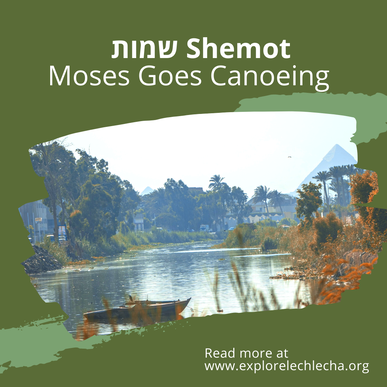
January 12, 2023
שמות
- Nadav Slovin
Moshe Rabbeinu (Moses) Goes Canoeing
Moshe Rabbeinu, the great prophet of our people who guides us from bitter enslavement to valient redemption; the humble leader of our people during forty harrowing years of strife and struggle in the barren desert, begins his journey with a simple canoe trip.
At just three months old his mother Yocheved launches him with hope and faith in a tiny tevah on a rocky float down the Nile to save him from impending euthanasia by the merciless Egyptian guard (whose fear fueled their hate).
We may see Moshe’s coming-of-age wilderness expedition as an insignificant detail to his life story, but the narrative indicates that we are mistaken. Moses’ name itself is a product of this story. When Pharaoh’s daughter discovers a floating boat with a baby paddler, she saves the lad from the Nile and names him Moshe, the verse tells us, כי מן-המים משיתהו, for I have drawn him from the water.
Moshe, the savior of our people, the humble vessel through whom Torah is revealed, the patient elder who forgives and begs for mercy, grows into himself on a journey that begins solo ~ a canoeing journey on the raging waters of the Nile river ~ and it is for this event that he is named.
For, in truth, everyone's journey into depth of insight, compassion for the stranger, and passion for truth begins with a step back, with a leap into the unknown, with a courageous launch into life’s waters, faithfully opening our hearts to where we may land.
Shabbat Shalom!
שמות
- Nadav Slovin
Moshe Rabbeinu (Moses) Goes Canoeing
Moshe Rabbeinu, the great prophet of our people who guides us from bitter enslavement to valient redemption; the humble leader of our people during forty harrowing years of strife and struggle in the barren desert, begins his journey with a simple canoe trip.
At just three months old his mother Yocheved launches him with hope and faith in a tiny tevah on a rocky float down the Nile to save him from impending euthanasia by the merciless Egyptian guard (whose fear fueled their hate).
We may see Moshe’s coming-of-age wilderness expedition as an insignificant detail to his life story, but the narrative indicates that we are mistaken. Moses’ name itself is a product of this story. When Pharaoh’s daughter discovers a floating boat with a baby paddler, she saves the lad from the Nile and names him Moshe, the verse tells us, כי מן-המים משיתהו, for I have drawn him from the water.
Moshe, the savior of our people, the humble vessel through whom Torah is revealed, the patient elder who forgives and begs for mercy, grows into himself on a journey that begins solo ~ a canoeing journey on the raging waters of the Nile river ~ and it is for this event that he is named.
For, in truth, everyone's journey into depth of insight, compassion for the stranger, and passion for truth begins with a step back, with a leap into the unknown, with a courageous launch into life’s waters, faithfully opening our hearts to where we may land.
Shabbat Shalom!
Sept. 18, 2022
כ״ב אלול תשפ״ב
Humans are amazing.
Would you rather get extremely dirty today or remain clean?
Would you rather wake up at 5am or 9am tomorrow morning?
Would you rather struggle to lift those legs once more or let your body lay low?
Humans are amazing. Though inclined to comfort and ease, most of us make choices to live lives of challenge. To take the plunge into a messy adventure, to seek the sunrise, and to encourage ourselves lovingly to reach that peak.
Why? Many reasons, no doubt. But one. One, indeed. We seek to meet our strength. We seek to meet our limits. We seek to meet ourselves, believing in the potential within, thirsty to taste of the ability with which we’ve been blessed.
Last night, long after the sun had set and the stars began their nightly dance, as the earth met the midnight of its orbit and darkness pines in all its glory for light’s return, Ashkenazi Jews joined our Sefardi companions in crying and calling out to the Eternal One in song.
Selichot - requesting for forgiveness, requesting for return. One week, to challenge ourselves, to wake the sun with our prayers, to chirp the birds to life, to meet our strength, meet our truth, meet the power of our will for connection.
